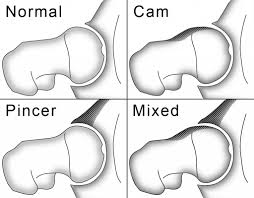Femoral Acetabular Impingement (FAI)
Femoroacetabular impingement or FAI is a condition of overstress to the hip joint.
Femoroacetabular impingement or FAI is a condition of overstress to the hip joint. Basically, the ball (femoral head) and socket (acetabulum) rub abnormally creating damage to the hip joint. The damage can occur to the articular cartilage (smooth white surface of the ball or socket) or the labral cartilage (soft tissue bumper of the socket). This is thought to be a common cause of hip osteoarthritis.
There are two types of FAI:
- Cam Impingement: describes the femoral head and neck relationship as aspherical or not perfectly round.
- Pincer Impingement: describes the situation where the socket or acetabulum has too much coverage of the ball or femoral head.
FAI is associated with cartilage damage, labral tears, early hip arthritis, hyperlaxity, sports hernias, and low back pain. FAI is common in high level athletes, but also occurs in active individuals.
Predisposing factors for this condition include:
- Activities involving high levels of running, jumping and landing
- Poor lower limb strength and flexibility
- Genetic predisposition, bony abnormality through femur or acetabulum
Pain and Symptoms
Symptoms can include some or all of the below:
- Pain is usually aggravated by activity, especially running and jumping
- Pain can radiate to different regions including; groin, outside of the hip, lower back and even down towards the knee.
Diagnosis
Examination in the clinic will usually indicate that there is a hip joint problem, however it won’t determine the cause. X-ray, Ultrasound and MRI imaging can be used to exclude other pathologies and to confirm and grade the extent of the injury
Treatment
Non-operative conservative management would usually involve the following:
- Activity Modification – This would often require a permanent modification from activities that aggravate the hip. This is usually sports that involve running, jumping and twisting movements.
- Strengthening – A lower limb strengthening program will be developed by your physiotherapist to help restore your full function and assist with return to activity.
It is important to realise that non-operative treatment cannot change the cause of the impingement and is frequently unsuccessful. There are several surgical options available that can be discussed with an Orthopaedic surgeon.

